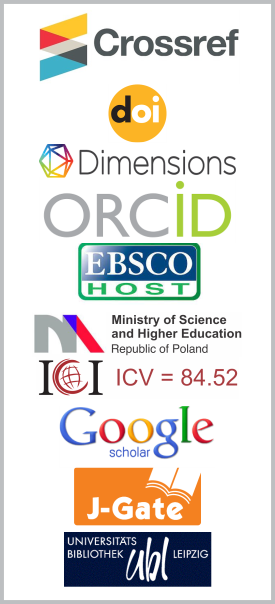Optimality in Multiobjective Subset Fractional Programming Involving Generalized Type \(n\)-Functions
DOI:
https://doi.org/10.26713/jims.v10i4.693Keywords:
Sufficiency, Fractional programming, \(n\)-functionsAbstract
In this paper we investigate the optimality in multiobjective subset fractional programming involving generalized type \(n\)-functions under \((F,\alpha,\rho, d)\)-type-I function. The results presented in this paper extend several results from the literature.Downloads
References
I. Ahmad and S. Sharma, Sufficiency in multiobjective subset programming involving generalized type-I functions, J. Glob. Optim. 39(3) (2007), 473 – 481, DOI: 10.1007/s10898-007-9150-4.
C.R. Bector, D. Bhatia and S. Pandey, Efficiency and duality for nonlinear multiobjective programs involving n-set functions, J. Math. Anal. Appl. 182 (1994), 486 – 500, DOI: 10.1006/jmaa.1994.1099.
D. Bhatia and P. Kumar, A note on fractional minmax programs containing n-set functions, J. Math. Anal. Appl. 215(2) (1997), 283 – 293.
D. Bhatia and A. Mehra, Lagrange duality in multiobjective fractional programming problems with n-set functions, J. Math. Anal. Appl. 236 (1999), 300 – 311, DOI: 10.1006/jmaa.1999.6425.
J.H. Chou, W.S. Hsia and T.Y. Lee, On multiple objective programming problems with set functions, J. Math. Anal. Appl. 105 (1985), 383 – 394, DOI: 10.1016/0022-247X(85)90055-1.
H.W. Corley, Optimization theory for n-set functions, J. Math. Anal. Appl. 127 (1987), 193 – 205, DOI: 10.1016/0022-247X(87)90151-X.
H.W. Corley and S.D. Roberts, A partitioning problem with applications in regional design, Oper. Res. 20 (1972), 1010 – 1019, DOI: 10.1287/opre.20.5.1010.
G. Dantzig and A. Wald, On the fundamental lemma of Neyman and Pearson, Ann. Math. Stat. 22 (1951), 87 – 93.
N. Datta, Efficiency in multi-objective fractional programming, J. Inform. Optim. Sci. 3 (1982), 262 – 268.
W. Dinklebach, On nonlinear fractional programming, Management Science 137 (1967), 492 – 498, DOI: 10.1287/mnsc.13.7.492.
A.M. Geoffrion, Proper efficiency and theory of vector maximization, J. Math. Anal. Appl. 22 (1968), 618 – 630, DOI: 10.1016/0022-247X(68)90201-1.
M. Hachimi and B. Aghezzaf, Sufficiency and duality in differentiable multiobjective programming involving generalized type-I functions, J. Math. Anal. Appl. 296 (2004), 382 – 392, DOI: 10.1016/j.jmaa.2003.12.042.
M.A. Hanson and B. Mond, Necessary and sufficient conditions in constrained optimization, Math. Program 37 (1987), 51 – 58, DOI: 10.1007/BF02591683.
R. Jagannathan, Duality for nonlinear fractional programs, Zeitschrift fur Operations Research 17 (1973), 1 – 3, DOI: 10.1007/BF01951364.
C.L. Jo, D.S. Kim and G.M. Lee, Duality for multiobjective fractional programming involving n-set functions, Optimization 29 (1994), 45 – 54, DOI: 10.1080/02331939408843935.
R.N. Kaul and V. Lyall, A note on nonlinear fractional vector maximization, Opsearch 26 (1989), 108 – 121.
D.S. Kim, C.L. Jo and G.M. Lee, Optimality and duality for multiobjective fractional programming involving n-set functions, J. Math. Anal. Appl. 224 (1998), 1 – 13.
H.C. Lai and J.C. Liu, Duality for a minmax programming problem containing n-set functions, J. Math. Anal. Appl. 229 (1999), 587 – 604.
Z.A. Liang, H.X. Huang and P.M. Pardalos, Efficiency conditions and duality for a class of multiobjective fractional programming problems, J. Glob. Optim. 27 (2003), 447 – 471, DOI: 10.1023/A:1026041403408.
L.J. Lin, Optimality of differentiable vector-valued n-set functions, J. Math. Anal. Appl. 149 (1990), 255 – 270, DOI: 10.1016/0022-247X(90)90299-U.
J.C. Liu, Optimality and duality for multiobjectional programming involving non-smooth pseudoinvex functions, Optimization 37 (1996), 27 – 39, DOI: 10.1080/02331939608844194.
R.J.T. Morris, Optimal constrained selection of a measurable set, J. Math. Anal. Appl. 70 (1979), 546 – 562, DOI: 10.1016/0022-247X(79)90064-7.
R.N. Mukherjee, Generalized convex duality for multiobjective fractional programs, J. Math. Anal. Appl. 162 (1991), 309 – 316, DOI: 10.1016/0022-247X(91)90151-O.
J. Neyman and E.S. Pearson, On the problem of themost efficient tests of statistical hypotheses, Philos. Trans. R. Soc. Lond. Ser. A 231 (1933), 289 – 337.
R. Osuna-Gómez, A. Rufián-Lizana and P. Ruíz-Canales, Multiobjective fractional programming with generalized invexity, Sociedad de Estadistica e investigacion operativa TOP 8(1) (2000), 97 – 110, DOI: 10.1007/BF02564830.
V. Preda, On minmax programming problems containing n-set functions, Optimization 22 (1991), 527 – 537, DOI: 10.1080/02331939108843695.
V. Preda, I.M. Stancu-Minasian and E. Koller, On optimality and duality for multiobjective programming problems involving generalized d-type-I and related n-set functions, J. Math. Anal. Appl. 283 (2003), 114 – 128, DOI: 10.1016/S0022-247X(03)00242-7.
S. Schaible, A survey of factional programming, in Generalized Convexity in Optimization and Economics, S. Schaible and W.T. Ziemba (Eds.), Academic Press (1981).
C. Singh and M.A. Hanson, Saddlepoint theory for nondifferentiable multiobjective fractional programming, J. Inform. Optim. Sci. 7 (1986), 41 – 48.
C. Singh, S.K. Suneja and N.G. Rueda, Preinvexity in multiobjective fractional programming, J. Inform. Optim. Sci. 13 (1992), 293 – 302.
S.K. Suneja and M.K. Srivastava, Duality in multiobjective fractional programming involving generalized invexity, Operational Research Society of India 31 (1994), 127 – 143.
P.K.C. Wang, On a class of optimization problems involving domain variations, in Lecture Notes in Control and Information Sciences 2, Springer, Berlin (1977).
T. Weir, Duality for nondifferentiable multiple objective fractional programming problems, Utilitas Math. 36 (1989), 53 – 64.
G.J. Zalmai, Sufficiency criteria and duality for nonlinear programs involving n-set functions, J. Math. Anal. Appl. 149 (1990) , 322 – 338.
Published
How to Cite
Issue
Section
License
Authors who publish with this journal agree to the following terms:- Authors retain copyright and grant the journal right of first publication with the work simultaneously licensed under a CCAL that allows others to share the work with an acknowledgement of the work's authorship and initial publication in this journal.
- Authors are able to enter into separate, additional contractual arrangements for the non-exclusive distribution of the journal's published version of the work (e.g., post it to an institutional repository or publish it in a book), with an acknowledgement of its initial publication in this journal.
- Authors are permitted and encouraged to post their work online (e.g., in institutional repositories or on their website) prior to and during the submission process, as it can lead to productive exchanges, as well as earlier and greater citation of published work.




